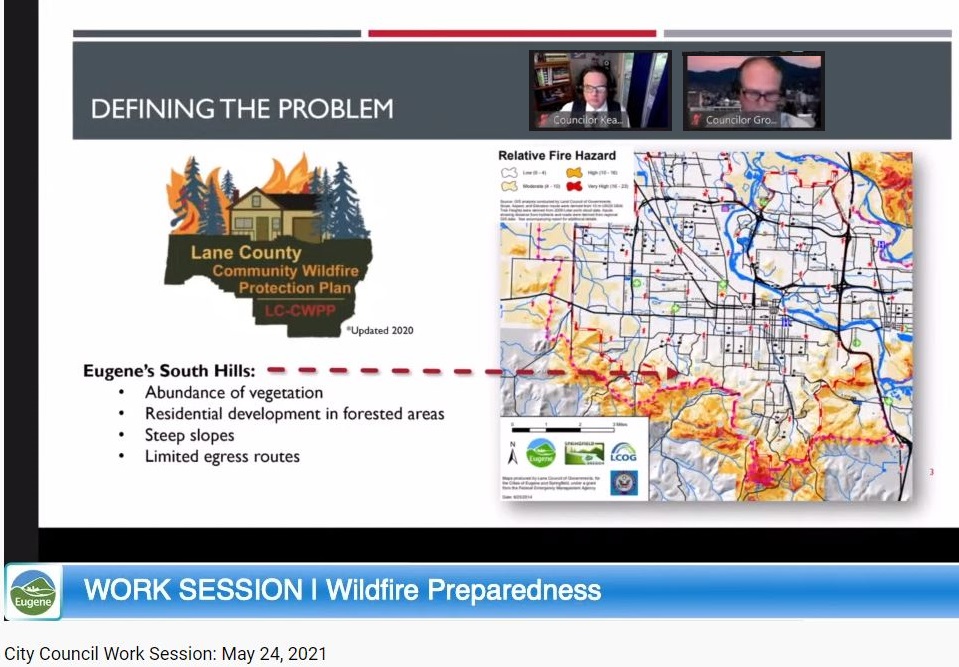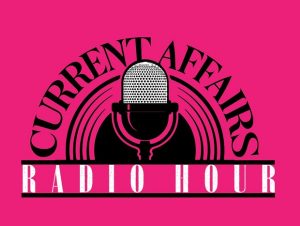Eugene’s newest councilors advocate for neighborhoods
4 min read
Eugene's two new city councilors promoted a South Eugene fireworks ban and neighborhood-based wildfire preparedness.
Eugene’s newest City Councilors spent a busy week advocating for neighborhoods. On Monday, Randy Groves promoted neighborhood-based wildfire preparedness, and Matt Keating proposed a fireworks ban in South Eugene. Councilor Keating.
City Councilor Matt Keating: [00:00:17] Move to direct the City Manager to prepare an ordinance and schedule a June 21st public hearing on an uncodified code amendment, banning the use of all fireworks south of 18th Avenue or east of Agate Street until 2023, and banning the sale of all fireworks south of 18th Avenue or east of Agate Street in 2022. The proposed ordinance should declare this matter an emergency and include an immediate effective date.
John Q: [00:00:45] The council agreed to a public hearing by a vote of six in favor, none opposed. Matt also drew the City’s attention to a fire hazard.
Thank you for supporting
local civic journalism
City Councilor Matt Keating: [00:00:55] A question has been cropping up in our neighborhood: South of 30th on Agate, there’s a lot of pockets of overgrown vegetation. Some is city owned and some is private property. There’s no nuisance vegetation authority on private property. And what is a neighbor to do if they can’t get a hold of a property owner, what are the channels to reach out? Folks want to be good neighbors, but there are some folks who are just frustrated because there’ve been lots that have been held for 40 plus years and they just can’t seem to navigate how to properly connect with the property owner. Is there something that you would suggest that the Council can do to be helpful in that regard? And in the meantime, what is a neighbor to do if they want to reduce the fuel load on adjacent property that is privately held and they just cannot communicate one way or another with the private entity who holds that land?
Jeff Chandler: [00:01:53] As the new vegetation manager and nuisance regulatory officer, I’m working on developing a way to guide property owners.
Vacant lots are abatable. If it is a vacant lot, if it’s easily mow-able, my program can get involved and we have a contractor that we’ll send after we’ve issued enough warnings to a property owner who is being negligent.
If it’s a developed lot, it’s a lot trickier. Due to private property and trespassing laws, my program can’t really enforce. We can get an abatement warrant, which takes a lot of community resources that the program doesn’t really have. And in those situations a neighbor ultimately has to take it to court and pursue legal action against another neighbor. So it gets rid of that friendly feel of a neighbor talking to a neighbor, which is a bummer.
City Councilor Matt Keating: [00:02:43] What’s the best way for the community to get in touch with you, Jeff and your program?
Jeff Chandler: [00:02:47] Yeah, my phone number is (541) 682-4821. And we have a website for the nuisance vegetation program. You can just Google the city of Eugene’s nuisance program.
City Councilor Matt Keating: [00:02:57] Okay, great. Thank you.
John Q: [00:02:59] On Wednesday, Matt Keating got an assurance from LTD to preserve or expand neighborhood bus service. He commented on a joint project with the City called “MovingAhead.”
City Councilor Matt Keating: [00:03:10] I also express enthusiasm around the opportunities that exists with all the aforementioned enhanced corridors. But at this juncture, I have some questions and concerns about currently existing neighborhood routes. My question is how does each one of these packages influence the number of buses or staff that are required to operate and maintain the the enhanced EmX routes? And how would those increases to service impact the possibility to improve and maintain the essential neighborhood routes that aren’t included on the MovingAhead map? And in particular, I’m concerned about West and most concerned about South Eugene routes.
City Councilor Randy Groves: [00:03:57] I share Councilor Keating’s concern for lack of routes. So I’ll add Southwest Eugene. It’s very difficult to get to the bus, in some cases a couple of miles, so you can get to a bus stop.
Andrew Martin: [00:04:11] Just really quickly: We have looked at the total operations costs. So the choice to build one of these doesn’t necessarily, it doesn’t we as part of this project, it doesn’t impact neighborhood bus service. I’ll just really simply we have looked at the operations costs and part of implementing this will be ensuring the LTD can financially do that. We have always done that in the past. Some of these actually result in lower operations costs, which means we might be able to put more service elsewhere. Some of them do increase operations costs and that I can provide that information to you, if you’d (like).
City Councilor Matt Keating: [00:04:44] Oh, that’s great. That’s encouraging to hear, because pre-pandemic, it’s been made clear that the budget was rather bleak. That’s encouraging. I would appreciate that follow-up. In order to support any one of these packages at all, though, I think having that information is essential for each of us to know the potential impacts. And it sounds like there aren’t impacts which is most encouraging and constituents here in South Eugene, especially, should be excited to hear that. So thank you.
John Q: [00:05:09] You can contact your City Council member directly or through your neighborhood association.





